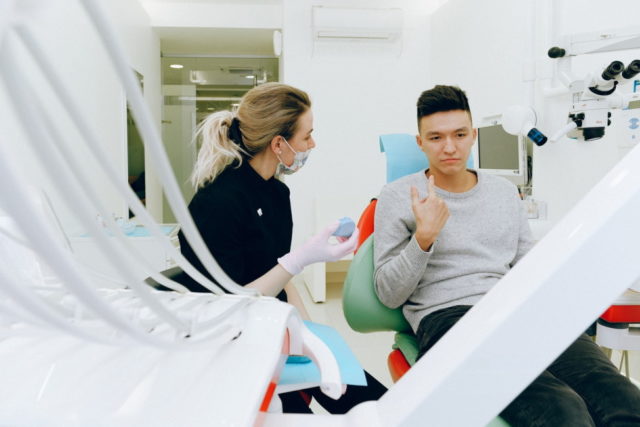
Most people put off going to the dentist until the smallest of oral problems become a dental emergency. In the U.S., over two million people rush to the emergency room due to dental pain annually. Rather than waiting around for unusual symptoms such as pain or bleeding to turn into a bigger problem, you should visit your dentist at the first signs of such symptoms.
Of course, not everyone is familiar with oral problem signs that require immediate dental assistance so we have them listed for you.
Swollen or bleeding gums
 You may think it is common for gums to bleed, post-brushing, it isn’t. Yes, there may be times that happen due to you exerting a little extra force when you brush. However, if you experience bleeding gums while brushing for three to four consecutive days, its a sign you need to see a dentist.
You may think it is common for gums to bleed, post-brushing, it isn’t. Yes, there may be times that happen due to you exerting a little extra force when you brush. However, if you experience bleeding gums while brushing for three to four consecutive days, its a sign you need to see a dentist.
Bleeding and swollen gums are underlying symptoms of gum disease which starts as gingivitis. According to Dr. Daniel Greenstein, an Ocala dentist, most patients ignore symptoms of gingivitis and let it develop into periodontitis, which results in tooth loss. Your dentist can help you control gum disease and the earlier to seek their assistance the less painful and easier the treatment process.
Receding gums
When gingivitis is left untreated it results in receding gums, the gums slowly pull away from your teeth, to a point where they are no longer attached to it. You should check your gums at least once a week, to ensure they are firmly attached to your teeth. With time, you will be able to tell if they start receding.
Receding gums are more than just a sign of bad oral health and gum disease. Studies have shown a link between gum disease and other medical conditions such as diabetes and cardiovascular disease. So, the sooner you can identify and treat gum disease the better it is for your overall health.
A cracked tooth
The slightest of cracks in your tooth can turn into a gateway for bacteria into it. Most people ignore minor cracks in their teeth after accidents because they don’t experience any pain. However, leaving your tooth cracked and untreated will lead to sensitivity due to an opening in the tooth and bacterial infection with time.
You should see a dentist right away so they can assess the impact of the crack. For minor cracks, they will likely rebond the tooth or fit a dental crown. For more serious cases, an extraction might be needed due to the tooth being badly damaged and no longer functional.
Sensitive teeth
 Sensitive teeth make it difficult for you to eat or drink anything hot or cold. Teeth become sensitive when their nerves are exposed. This is also an underlying sign of a cracked tooth or tooth decay. Your dentist can assess your teeth to identify the cause of sensitivity and suggest treatment accordingly.
Sensitive teeth make it difficult for you to eat or drink anything hot or cold. Teeth become sensitive when their nerves are exposed. This is also an underlying sign of a cracked tooth or tooth decay. Your dentist can assess your teeth to identify the cause of sensitivity and suggest treatment accordingly.
Pus formation
You should consult your dentist as soon as you notice the slightest of pus in your mouth. Pus in your gums or at the root of your teeth is the result of dental or gum abscess. This happens when there is a serious bacterial infection in the tooth or gums. If you choose to ignore an abscessed tooth, the bacteria can spread to other parts of your body including the brain through the blood vessels in your gums.
Dry mouth
Dry mouth is a concern because it results in low production of saliva, leaving your mouth more prone to infection. Saliva plays a vital role in your mouth from ensuring it is lubricated to helping your teeth fight cavity. Lower production of saliva gives the millions of bacteria a chance to thrive in your mouth. Leaving your teeth and gums vulnerable to infection.
Medication for diabetes or high blood pressure is usually the most common cause of dry mouth. Your dentist can prescribe medication to counter the side effects of such medication to rid you of dry mouth.
Bad breath
While it is common to have bad breath after a good night of rest, persistent bad breath isn’t. Persistent bad breath is an underlying problem for gum disease, acid reflux, and metabolic disorder such as diabetes. Your dentist can help you identify whether or not bad breath is a direct cause of an oral problem or not.
Your mouth is equally important as any other part of your body. It is important that you take care of your oral health and see your dentist at the slightest sign of any irregularity with your mouth. This way you can be on top of any underlying oral problem before they become serious.












